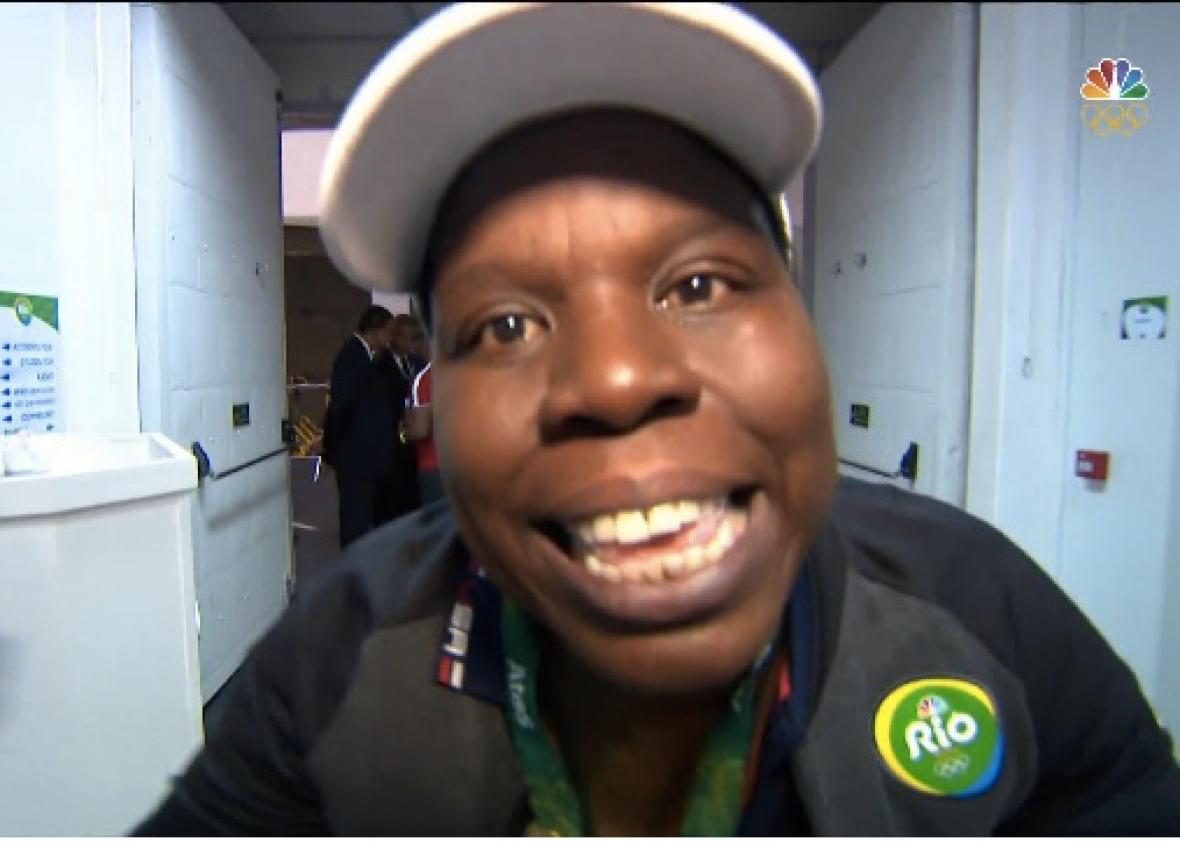Recruiting Leslie Jones May Have Been a Cynical Move for NBC, but Damn Is She Making Its Coverage Better

NBC
As Olympic gymnast Gabby Douglas withstood a storm of attacks on social media over the weekend—comments about her appearance, unmerited skepticism of her patriotism, assorted instances of bullying—one particularly notable expression of support emerged on Twitter. Leslie Jones had temporarily quit the platform under similar circumstances, in July, before emerging as a superstar Olympic Tweeter just a few weeks later. With newfound attention coming her way, the comic responded to the Douglas controversy on Monday with a poignant message—“show her the love you showed me”—and the support hashtag #LOVE4GABBYUSA. The timing was uniquely significant, too, since Jones had made her debut on NBC the night before, as the network’s newest Olympics contributor.
NBC’s official coverage of the Rio de Janeiro Olympics has been roundly criticized, with specific attention paid to its occasional tone-deafness on issues of race and gender. The network has been called out for attributing female athletes’ achievements and talents to men, generalizing female viewers as nonsports fans who want the games to feel like “the ultimate reality show,” and—going back to 2012—airing commercials with troubling racial undertones during the competition’s prime hours.* More broadly, critics have called the coverage overly simplistic, arguing that it mistakes sweeping patriotism for well-crafted entertainment. Todd VanDerWerff of Vox bluntly described the production as “atrocious,” adding that “harmless nationalism is a big part of watching the games, but NBC sometimes seems to think it’s the only part.”
With regard to Leslie Jones’ hiring, that last point is key. As the Olympics began, Jones—who has an ongoing relationship with NBC as a Saturday Night Live cast member—was unwaveringly enthusiastic in her tweets and Instagram posts, sporting Team USA gear and introducing the consummate Team USA slogan, “USA Slay All Day.” That kind of undeniable, uncomplicated patriotism was what allowed Jones to go viral in the first place—and it was also what made her an ideal, if unconventional (SNL cast members don’t routinely get plucked from social media and shipped off to the Olympics as commentators), fit for NBC. The network’s mild, by-the-book, pro-USA focus is not something NBC is likely to deviate from, given the range of viewers it intends to reach. But so far its presentation has felt less “patriotic” than formulaic, calculated, and sappy. Except for Jones.
In the days leading up to her first televised appearance, NBC teased Jones’ debut on social media, providing snippets of her excitedly exploring Rio and basking in the presence of extraordinary athletes. The stunt was, in many ways, a tacky exercise in hype by the network—an attempt to boost the reach of its coverage without departing from its corny script, and a partial corrective for the bad press that had preceded Jones’ addition. Speaking of Jones’ social media presence during the Olympics, NBC anchor Ryan Seacrest said on Sunday, “It caught America’s eye, and it caught ours too.” On Tuesday morning, Today host Billy Bush flattered his new colleague, lavishly explaining that “her infectious nationalism knows no bounds.” Indeed, NBC has appeared infatuated with its new contributor in the days since she came aboard, gleefully spotlighting her presence (and her brilliant expressions) at various events around Rio.
But cynicism aside, Jones is legitimately contributing something vital to NBC’s coverage, not to mention the broader conversation surrounding this year’s Olympics. During her first segment on air, she told Seacrest that she grew up watching the games with her father, and that, to her, they have always represented “a time where all of us can forget about the B.S. that’s going on and come together”—a powerful sentiment considering the divisive hate that she’d encountered just a month earlier. One emotional clip highlighted Jones in tears, as she watched gymnast Simone Biles win the gold medal; Jones later told Seacrest that it was the combination of watching her country win, and watching an black American woman win, that moved her so visibly. And consider the main reference point for Jones’ “USA Slay All Day” mantra: Beyoncé’s “Formation,” which has incited controversy on the basis of its bold affirmation for Black Lives Matter.
In 2016, regular contributors on NBC’s Olympics team have shown little interest in departing from the network’s standard narratives. Inadvertently or not, their default styles of commentary have sometimes marginalized the accomplishments of American women, people of color, and LGBTQ people. In the case of Biles, the network aired a promotional package that depicted the gymnast as a manicure-loving shopaholic, one of the moments that rendered Biles’ declaration that she’s “the first Simone Biles”—as opposed to, say, the next Michael Phelps—so potent.
Jones, meanwhile, fixates on Biles’ pure athleticism. “She is … BAD,” she said, awestruck, after watching Biles win a gold medal. “Whew! She’s a flipper.” (She also shrieked at full force during one of Biles’ routines.) And she has similarly applauded the skills of Gabby Douglas—Biles’ gold-medal-winning predecessor. Her enthusiasm is boundless: “Michael Phelps is a BEAST!” she yelled after seeing Phelps take gold. Amid a lineup of cookie-cutter correspondents in Rio, her passion is contagious, her style uniquely candid. She’s a perfect proxy for the rest of us watching the games at home. Since arriving in Rio, she has been delivering NBC’s messages with the kind of authenticity and energy that the network had been otherwise unable to muster. She relays genuine interest in every event. She gives “harmless nationalism” some spike.
*Correction, Aug. 22, 2016: This post originally misidentified the year in which NBC aired a racially controversial Olympics commercial. It was in 2012, not 2016.

